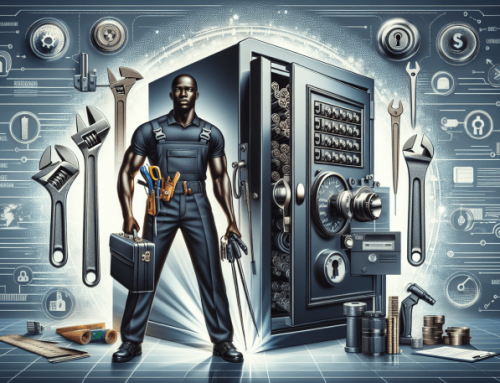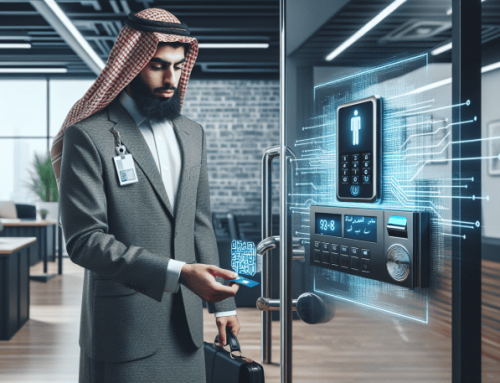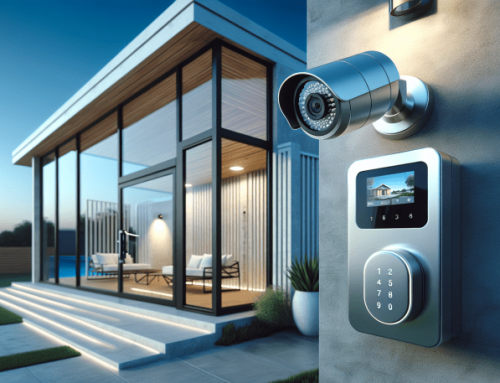In an era where security is paramount, understanding the importance of locks in government building security is crucial. iLocksmiths, a leading provider of 24/7 locksmith services in New York City, emphasizes the significance of robust locking systems in safeguarding government facilities. With over 11 years of experience in the locksmith industry, we have seen firsthand how high-quality locks contribute to the overall security of these buildings. This blog post will delve into the role of locks in government building security, highlighting their importance in maintaining the integrity of these structures. We will also discuss how our automotive, residential, and commercial locksmith services can be tailored to meet the unique security needs of government buildings. With our fast response time and commitment to customer satisfaction, iLocksmiths is your trusted partner in ensuring the safety and security of your premises.
Understanding the Role of Locks in Government Building Security
Government buildings are often the hub of crucial information and activities. As such, their security is of paramount importance. One of the key elements in ensuring this security is the use of locks. The role of locks in government building security is multi-faceted and extends beyond merely restricting access.
Locks serve as the first line of defense in securing government buildings. They prevent unauthorized entry, thereby safeguarding the people, information, and assets within. High-security locks, such as those provided by commercial locksmiths, are particularly effective in this regard. These locks are designed to resist picking, drilling, and other forms of forced entry.
Moreover, locks can also provide a means of controlling and monitoring access. With the advent of advanced technologies, many government buildings now use electronic locking systems. These systems can be programmed to allow access only to authorized personnel and at specific times. They can also keep a record of who has accessed the building and when, providing valuable data for security audits.
“The use of advanced locking systems in government buildings not only enhances security but also facilitates efficient access control.”
In addition to securing doors, locks are also used to secure cabinets, safes, and other storage units within government buildings. This is particularly important in buildings that house sensitive or classified information. The use of high-security locks in these instances helps to prevent unauthorized access and information leaks.
- High-security locks for doors
- Electronic locking systems for access control
- Locks for securing cabinets and safes
However, the effectiveness of locks in ensuring government building security largely depends on their quality and the expertise with which they are installed and maintained. Therefore, it is essential to engage the services of professional locksmiths, such as those at iLocksmiths, who have the necessary skills and experience.
Locks also need to be regularly inspected and maintained to ensure their continued effectiveness. Any necessary repairs or replacements should be promptly carried out by a professional locksmith service. This helps to prevent any potential security breaches due to faulty or outdated locks.
In conclusion, locks play a vital role in government building security. They not only prevent unauthorized entry but also facilitate access control and secure valuable assets and information. However, to fully leverage the benefits of locks, it is essential to ensure their quality, proper installation, and regular maintenance.
For more information on the role of locks in government building security, visit iLocksmiths service areas.
The Different Types of Locks Used in Government Buildings
Government buildings, being the hub of critical operations and sensitive information, require an advanced level of security. One of the most fundamental aspects of this security is the use of locks. The types of locks used in government buildings are diverse, each serving a specific purpose and providing a unique level of security.
The most common type of lock used in government buildings is the deadbolt lock. Deadbolt locks are known for their strength and resistance to forceful entry. They are typically used on exterior doors and are often paired with a doorknob lock for added security. Deadbolt locks can be single or double cylinder, with the latter requiring a key from both inside and outside. This type of lock is a staple in residential locksmith services but is also widely used in government buildings due to its reliability.
Another type of lock frequently used in government buildings is the mortise lock. Mortise locks are installed into a cut-out within the door, making them difficult to pick or break. They are often used in older buildings due to their vintage look, but they also provide a high level of security, making them suitable for government buildings.
Government buildings also make use of high-security cylinder locks. These locks are resistant to picking, drilling, and other forms of unauthorized entry. They often come with a security card that is required for making key duplicates, adding an extra layer of security. High-security cylinder locks are a common feature in commercial locksmith services.
Electronic locks are becoming increasingly popular in government buildings. These locks can be controlled remotely and can be programmed to allow access only at certain times or to certain individuals. They can also keep a record of who has accessed the building, providing valuable information in case of a security breach. Electronic locks are a significant part of security systems in modern buildings.
Biometric locks are also used in government buildings, especially in areas where highly sensitive information is stored. These locks use unique physical or behavioral characteristics, such as fingerprints or voice recognition, to allow access. This type of lock provides a high level of security as these characteristics are nearly impossible to duplicate.
In conclusion, the types of locks used in government buildings range from traditional deadbolt and mortise locks to high-security cylinder locks and advanced electronic and biometric locks. Each type of lock provides a unique level of security and serves a specific purpose, contributing to the overall security of the building. It is crucial to choose the right type of lock based on the security needs of the building, and professional locksmith services can provide valuable guidance in this regard.
The Evolution of Lock Technology in Government Security
The security of government buildings is a matter of national importance. One of the key aspects of this security is the use of locks. Over the years, lock technology has evolved significantly, with advancements being incorporated into government security systems to ensure maximum protection.
In the early days, mechanical locks were the standard. These locks, which required a physical key to open, were simple yet effective. However, they were also susceptible to picking and other forms of manipulation. As a result, locksmiths began to develop more complex locking mechanisms to counter these threats.
The introduction of electronic locks marked a significant turning point in lock technology. These locks, which use electrical current to operate, offer a higher level of security than their mechanical counterparts. They can be programmed to allow access only to certain individuals and can also keep a record of who has accessed a particular area. This makes them an ideal choice for government buildings, where access control and accountability are of utmost importance.
In recent years, the advent of smart locks has taken government security to a whole new level. These locks, which can be controlled remotely using a smartphone or other device, offer a host of features that make them highly suitable for use in government buildings. For instance, they can be programmed to lock or unlock at specific times, and can also send alerts in case of any unauthorized access attempts.
However, the evolution of lock technology in government security is not just about the locks themselves. It also involves the services of professional locksmiths, who play a crucial role in installing, maintaining, and upgrading these locks. For instance, at iLocksmiths, we offer a range of commercial locksmith services that cater specifically to the needs of government institutions.
Our team of experts is well-versed in the latest lock technologies and can provide tailored solutions to meet the unique security needs of each government building. Whether it’s installing a new smart lock system or upgrading an existing one, we have the skills and experience to get the job done right.
Moreover, we also offer regular maintenance services to ensure that these locks continue to function optimally over time. This includes routine inspections, cleaning, and repairs, as well as emergency services in case of any issues.
In conclusion, the evolution of lock technology has had a profound impact on government security. From mechanical locks to electronic and smart locks, each advancement has brought with it a higher level of security and convenience. And with the help of professional locksmiths like those at iLocksmiths, government institutions can ensure that they are always at the forefront of this evolution.
To learn more about our services or to schedule an appointment, please contact us today. We look forward to helping you enhance the security of your government building.
Key Factors in Choosing the Right Locks for Government Buildings
Government buildings, due to their nature, often house sensitive information and are therefore a potential target for security breaches. Ensuring the right locks are in place is a crucial aspect of maintaining the security of these buildings. There are several key factors to consider when choosing the right locks for government buildings.
Firstly, the type of lock is a significant consideration. Traditional locks, while still widely used, are not always the most secure option. Modern technology has introduced a variety of advanced locking systems, such as biometric locks, electronic locks, and smart locks. These locks offer a higher level of security and are often more convenient to use. For instance, biometric locks, which use unique biological characteristics like fingerprints or iris patterns, are virtually impossible to pick or bypass. You can learn more about these advanced lock systems on our commercial locksmith page.
Secondly, the durability of the lock is another crucial factor. Government buildings often see a high volume of traffic, which means the locks need to withstand frequent use. Locks made from robust materials like brass, steel, or zinc alloy are typically more durable and resistant to wear and tear.
Thirdly, the level of security required is a vital factor. Not all areas within a government building require the same level of security. For instance, areas housing sensitive information may require high-security locks, while less sensitive areas may only require standard locks. It’s essential to assess the security needs of each area within the building and choose locks accordingly.
Fourthly, the ease of use and accessibility should also be considered. While security is paramount, it’s also important that authorized personnel can easily access the areas they need to. Therefore, locks should be user-friendly and not overly complicated to operate.
Lastly, the installation and maintenance of the locks are also important factors. Choosing a reputable and experienced locksmith company is crucial to ensure the locks are correctly installed and maintained. Our contact page provides information on how to get in touch with us for professional locksmith services.
In conclusion, choosing the right locks for government buildings involves careful consideration of several factors, including the type of lock, durability, security level, ease of use, and installation and maintenance. By considering these factors, government buildings can ensure they have the most secure and suitable locks in place. For more information on our locksmith services, including residential, automotive, and security cameras, visit our homepage.
The Impact of Biometric Locks on Government Building Security
Biometric locks have revolutionized the security landscape, particularly in government buildings where the need for high-level security is paramount. These advanced locking systems use unique biological characteristics such as fingerprints, iris patterns, and facial recognition to grant or deny access, thereby enhancing the security of government buildings significantly.
One of the key benefits of biometric locks is their ability to provide a high degree of accuracy. Traditional locks can be picked, and keys can be lost, stolen, or duplicated. However, biometric data is unique to each individual, making it nearly impossible to forge or duplicate. This ensures that only authorized personnel can gain access to sensitive areas, reducing the risk of security breaches.
Another advantage of biometric locks is their efficiency. With traditional locks, time is often wasted searching for lost keys or waiting for locksmiths to unlock doors. Biometric locks eliminate this problem as they allow for quick and easy access. This not only saves time but also enhances productivity in government buildings.
Moreover, biometric locks offer a high level of flexibility. They can be programmed to grant access to specific individuals at certain times, providing an added layer of security. For instance, cleaning staff can be granted access only during their designated cleaning hours. This feature is particularly useful in government buildings where different levels of clearance may be required.
Biometric locks also provide a reliable audit trail. They record every access attempt, including the date, time, and the identity of the person. This data can be invaluable in investigations following security breaches. It also serves as a deterrent, discouraging unauthorized access attempts.
Despite these benefits, it’s important to note that biometric locks are not infallible. They can be affected by changes in the user’s biometric data due to aging, injury, or illness. Moreover, they can be susceptible to technical glitches and power outages. Therefore, it’s crucial to have a reliable commercial locksmith service provider on hand to address any issues promptly.
In conclusion, biometric locks have a significant impact on government building security. They offer a high level of accuracy, efficiency, flexibility, and provide a reliable audit trail. However, they also have their limitations and require regular maintenance and support from a professional locksmith service provider. Therefore, while biometric locks are an integral part of government building security, they should be used in conjunction with other security measures such as security cameras and alarm systems for optimal security.
For more information on biometric locks and other advanced locking systems, feel free to contact us. Our team of experienced locksmiths is always ready to provide expert advice and support.
The Role of Lock Maintenance in Ensuring Government Building Security
In the realm of government building security, the importance of locks cannot be overstated. These seemingly simple devices play a crucial role in maintaining the integrity of sensitive information, protecting valuable assets, and ensuring the safety of personnel. However, the effectiveness of locks in fulfilling these roles is heavily dependent on their maintenance.
Lock maintenance is a critical aspect of security management in government buildings. It involves regular inspection, cleaning, lubrication, and repair of locks to ensure they function optimally at all times. Without proper maintenance, locks can become unreliable or fail, compromising the security of the building.
Regular inspection of locks is a key component of lock maintenance. This involves checking the physical condition of the lock, testing its functionality, and assessing its resistance to picking, drilling, or other forms of unauthorized access. Any signs of wear, damage, or tampering should be addressed immediately to prevent potential security breaches.
Cleaning and lubrication are also essential for maintaining the performance and longevity of locks. Over time, dust, dirt, and grime can accumulate in the lock mechanism, causing it to become stiff or jammed. Regular cleaning with a suitable product can prevent this buildup and keep the lock functioning smoothly. Similarly, lubrication helps to reduce friction within the lock mechanism, ensuring smooth operation and reducing wear.
Repairs and replacements are another important aspect of lock maintenance. Even with regular care, locks can become worn or damaged over time. In such cases, prompt repair or replacement is essential to maintain the security of the building. This should be carried out by a professional locksmith to ensure the lock is correctly installed and functioning as it should.
In addition to these routine maintenance tasks, it’s also important to regularly review and update the locking systems in government buildings. With advances in technology, new and more secure locks are continually being developed. Regularly updating locks to incorporate these advancements can significantly enhance the security of government buildings.
Lock maintenance is not a task that should be undertaken lightly or without the necessary skills and knowledge. It requires a professional approach and a deep understanding of lock mechanisms and security systems. For this reason, it’s recommended to enlist the services of a professional locksmith, such as those at iLocksmiths.
With their expertise in lock maintenance, iLocksmiths can ensure the locks in your government building are always in top condition, providing the highest level of security. They offer a range of services, from routine maintenance and repairs to the installation of advanced locking systems.
In conclusion, lock maintenance plays a vital role in ensuring the security of government buildings. By keeping locks in optimal condition and regularly updating locking systems, it’s possible to significantly enhance the security of these buildings. However, this is a task that requires professional expertise, making it essential to enlist the services of a reputable locksmith like iLocksmiths.
Future Trends in Lock Technology for Government Security
The security of government buildings is of paramount importance, and locks play a crucial role in ensuring this security. As technology advances, so does the sophistication of lock systems. The future of lock technology for government security is set to be influenced by several emerging trends.
One of the most significant trends is the shift towards digital and smart locks. These locks offer a higher level of security than traditional mechanical locks, as they can be controlled remotely and can provide real-time updates on their status. They can also be integrated with other security systems, such as security cameras, to provide a comprehensive security solution.
Biometric technology is another trend that is set to shape the future of lock technology. Biometric locks use unique physical or behavioral characteristics, such as fingerprints, iris patterns, or voice recognition, to verify identity. This makes them extremely secure, as these characteristics are nearly impossible to duplicate. Biometric locks also offer the convenience of keyless entry, which can be particularly useful in high-security areas where access needs to be tightly controlled.
Another emerging trend is the use of AI and machine learning in lock technology. These technologies can be used to analyze patterns of behavior and identify any unusual or suspicious activity. For example, if a door is accessed at an unusual time or if there is an attempt to force the lock, the system can automatically alert security personnel.
The rise of IoT (Internet of Things) is also set to impact the future of lock technology. IoT-enabled locks can be connected to the internet and controlled remotely, allowing for real-time monitoring and control. This can be particularly useful in large government buildings where there are multiple access points.
While these trends offer exciting possibilities for enhancing security, they also present challenges. For example, digital and smart locks are vulnerable to cyber-attacks, and biometric data can raise privacy concerns. Therefore, it is crucial that these technologies are implemented in a way that balances security with respect for privacy and data protection.
In conclusion, the future of lock technology for government security is set to be shaped by advances in digital technology, biometrics, AI, and IoT. These technologies offer the potential to enhance security and convenience, but they also present new challenges that need to be carefully managed. As a leading provider of commercial locksmith services, we are committed to staying at the forefront of these trends and providing our clients with the most advanced and secure lock solutions.
For more information on our services or to discuss your security needs, please contact us.
In conclusion, the significance of locks in government building security cannot be overstated. They serve as the first line of defense, protecting sensitive information, valuable assets, and the people within these structures. High-quality, advanced locks can deter potential threats, restrict unauthorized access, and provide a sense of security to those working within these buildings. As technology continues to evolve, it’s crucial for government institutions to stay updated and invest in the most secure locking systems available. This will not only enhance their security measures but also demonstrate their commitment to safety and protection. After all, a secure government building is a testament to a secure government, fostering trust and confidence among its citizens.






